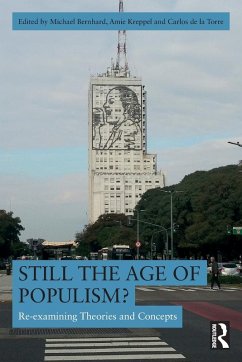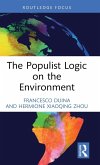Still the Age of Populism? investigates current conceptions of populism and its relevance across the globe. Using contextualized case studies, cross-national comparisons, and theoretical interventions, this volume addresses key conceptual debates in comparative politics and political sociology.
This essential volume brings together scholars from different traditions in political sociology, political science and cultural studies, and comparativists and area experts working on Latin America, Western and Eastern Europe, and the US. Chapters in the book employ innovative theoretical approaches to study aspects of populism in global comparative perspective whilst regional case studies, including Brazil, Venezuela, Germany, and the US, are utilised to explore populism in geographically specific contexts. In doing so, the volume addresses the key issues for those seeking to understand contemporary populism. What are the advantages and limits of the category of populism to understand contemporary debates on democratization and processes of democratic erosion? Under what structural, institutional, and cultural conditions does populism emerge? Is populism the nemesis of democracy, its shadow, or a path to move beyond "liberal democracy" towards "real democracy"? What lessons does the history of past populist moment hold for our understanding of contemporary populist governance? Under what conditions have populists in office led to political polarization and democratic erosion? What comes after populism, and how do societies deal with its legacies?
Still the Age of Populism? will be of interest to a broad audience of students and scholars of political sociology and comparative politics.
This essential volume brings together scholars from different traditions in political sociology, political science and cultural studies, and comparativists and area experts working on Latin America, Western and Eastern Europe, and the US. Chapters in the book employ innovative theoretical approaches to study aspects of populism in global comparative perspective whilst regional case studies, including Brazil, Venezuela, Germany, and the US, are utilised to explore populism in geographically specific contexts. In doing so, the volume addresses the key issues for those seeking to understand contemporary populism. What are the advantages and limits of the category of populism to understand contemporary debates on democratization and processes of democratic erosion? Under what structural, institutional, and cultural conditions does populism emerge? Is populism the nemesis of democracy, its shadow, or a path to move beyond "liberal democracy" towards "real democracy"? What lessons does the history of past populist moment hold for our understanding of contemporary populist governance? Under what conditions have populists in office led to political polarization and democratic erosion? What comes after populism, and how do societies deal with its legacies?
Still the Age of Populism? will be of interest to a broad audience of students and scholars of political sociology and comparative politics.
"This volume represents a forward leap in the study of populism. It tackles classic questions and takes on new ones and generally features some of the best thinking on the topic. It succeeds not only in clarifying but also defining the state of the field. The great strength of the volume is the sheer variety in the cases, issues, and approaches on display within its pages. Reading it is always interesting and often exciting."
Marco Garrido, Associate Professor of Sociology, University of Chicago, USA
"An innovative, coherent, and cogent anthology that approaches populism in new ways. Still the Age of Populism? has a tripartite conceptual frame that allows for new definitions of populism; contemporary issues to put under the populist lens; and new analyses of populism in power. The anthology works for scholars and classroom use. The disciplinary range of the contributors, the global reach of cases and the compelling analyses in the essays will guide and lead the discussion of comparative populism for years to come."
Mabel Berezin, Distinguished Professor of Arts & Sciences in Sociology and Director of the Institute for European Studies, Cornell University, USA
"This volume provides much food for thought. Chapters devoted to various populist cases - on the left and right, in Europe, Latin America and elsewhere - explore with nuance and complexity what happens when existing political systems fail to effectively represent citizens and stem their perceived loss of control. Threaded across the chapters and brought out well in the book's ably crafted introduction and conclusion is how populist politicians restore a sense of agency in a chaotic and changing world, if only by offering deceptively simple solutions. Developments including the election of Javier Milei in Argentina and the strong showing of Geert Wilders in the Netherlands reinforce the book's suggestion that indeed, it is still the age of populism. As long as people feel a loss of control and personalist leaders are willing to take advantage of those fears, populism is unlikely to fade soon."
Wendy Hunter, Professor of Political Science, University of Texas, USA
Marco Garrido, Associate Professor of Sociology, University of Chicago, USA
"An innovative, coherent, and cogent anthology that approaches populism in new ways. Still the Age of Populism? has a tripartite conceptual frame that allows for new definitions of populism; contemporary issues to put under the populist lens; and new analyses of populism in power. The anthology works for scholars and classroom use. The disciplinary range of the contributors, the global reach of cases and the compelling analyses in the essays will guide and lead the discussion of comparative populism for years to come."
Mabel Berezin, Distinguished Professor of Arts & Sciences in Sociology and Director of the Institute for European Studies, Cornell University, USA
"This volume provides much food for thought. Chapters devoted to various populist cases - on the left and right, in Europe, Latin America and elsewhere - explore with nuance and complexity what happens when existing political systems fail to effectively represent citizens and stem their perceived loss of control. Threaded across the chapters and brought out well in the book's ably crafted introduction and conclusion is how populist politicians restore a sense of agency in a chaotic and changing world, if only by offering deceptively simple solutions. Developments including the election of Javier Milei in Argentina and the strong showing of Geert Wilders in the Netherlands reinforce the book's suggestion that indeed, it is still the age of populism. As long as people feel a loss of control and personalist leaders are willing to take advantage of those fears, populism is unlikely to fade soon."
Wendy Hunter, Professor of Political Science, University of Texas, USA









